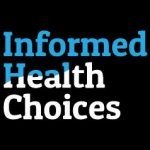
Informed Health Choices Podcasts
Each episode includes a short story with an example of a treatment claim and a simple explanation of a Key Concept used to assess that claim
| 1 Comment | Evaluated
Informed Health Choices Primary School Resources
A textbook and a teachers’ guide for 10 to 12-year-olds. The textbook includes a comic, exercises and classroom activities.
| 0 Comments | Evaluated
Ebm@school – a curriculum of critical health literacy for secondary school students
A curriculum based on the concept of evidence-based medicine, which consists of six modules.
| 0 Comments | Evaluated
Sunn Skepsis
Denne portalen er ment å gi deg som pasient råd om kvalitetskriterier for helseinformasjon og tilgang til forskningsbasert informasjon.
| 0 Comments
Foreign substances in your precious bodily fluids
Ben Goldacre points out that there is no evidence giving strong support either to water fluoridationists or to anti-fluoridationists.
| 0 Comments
Introduction to Evidence-Based Medicine
Bill Caley’s 26 slides with notes used as an ‘Introduction to Evidence-Based Medicine’.
| 0 Comments
Tamiflu: securing access to medical research data
A campaign by researchers has shown that Roche spun the research on Tamiflu to meet their commercial ends.
| 0 Comments
Why treatment comparisons are essential
Formal comparisons are required to assess treatment effects and to take account of the natural course of health problems.
| 0 Comments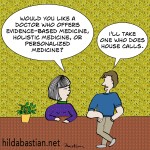
House Calls Please
Beware reliance on 'experience' without reference to relevant evidence.
| 0 Comments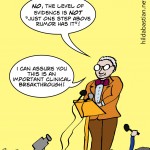
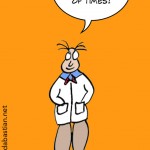

Smart Health Choices: making sense of health advice
The Smart Health Choices e-book explains how to make informed health decisions.
| 0 Comments
Routine use of unvalidated therapy is less defensible than careful research to assess the effects of those treatments
It is more difficult to obtain consent to give a treatment in a clinical trial than to give the same treatment for patients in practice.
| 2 Comments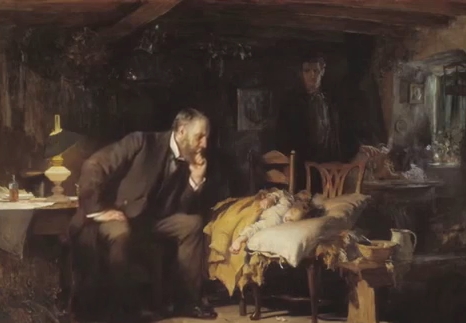
Viva la Evidence!
A brilliant song and video by James McCormack explaining the basics of evidence-based medicine.
| 0 Comments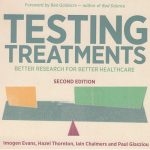
Doctors talk about guesswork in prescribing
In a fictional conversation between two doctors, a general practitioner makes the following point: ‘Tons of what we do is […]
| 0 Comments
On being sucked into a maelstrom
In 2006, a patient in the UK, who happened to be medically trained, found herself swept along by the Herceptin […]
| 0 Comments
Breast cancer
The treatment of breast cancer provides another example of professional uncertainty. There is considerable variability in the use of surgery, […]
| 0 Comments
Caffeine for breathing problems in premature babies
Large variations in the treatments used for a particular condition provide clear evidence of professional uncertainty about the relative merits […]
| 0 Comments
Breast cancer screening: well established but remains contentious
Since routine breast screening with mammography is well established in many countries one could well assume that mammographic screening must […]
| 0 Comments
Biased ethics
‘If a clinician tries a new therapy with the idea of studying it carefully, evaluating outcomes, and publishing the results, […]
| 0 Comments
Could checking the evidence first have prevented a death?
‘In a tragic situation that could have been averted, Ellen Roche, a healthy, 24-year-old volunteer in an asthma study at […]
| 0 Comments
Believing is seeing
The British doctor Richard Asher noted in one of his essays for doctors: ‘If you can believe fervently in your […]
| 0 Comments
The need to go beyond impressions
If patients believe that something helps them, isn’t that enough? Why is it important to go to the trouble and […]
| 0 Comments
Addressing uncertainty is professional
‘One of the key attributes of professionalism . . . should be the ability to identify and address uncertainty in […]
| 0 Comments
Facing up to uncertainties: a matter of life and death
‘Failure to face up to uncertainties about the effects of treatments can result in avoidable suffering and death on a […]
| 0 Comments
When practitioners disagree
In this sub-section Introduction (this page) Caffeine for breathing problems in premature babies Antibiotics in pre-term labour Breast cancer Introduction […]
| 2 Comments
The Screening Circus
In 2009, a recently retired professor of neurology with a long-standing interest in stroke prevention learnt that neighbours had received […]
| 0 Comments
The classical (Halstead) radical mastectomy
The radical mastectomy, devised in the late 19th century by William Halsted, was the most commonly performed operation for breast […]
| 0 Comments
We do things because…
‘We [doctors] do things, because other doctors do so and we don’t want to be different, so we do so; […]
| 0 Comments
No wonder she was confused
In January 2004, a hysterectomy patient wrote this letter to The Lancet: ‘In 1986 I had a hysterectomy because of […]
| 0 Comments
Hormone Replacement Therapy (HRT)
In women going through the menopause, hormone replacement therapy (HRT) is very effective in reducing the distressing hot flushes that […]
| 0 Comments
Diethylstilboestrol
At one time, doctors were uncertain whether pregnant women who had previously had miscarriages and stillbirths could be helped by […]
| 0 Comments
Advice on babies’ sleeping position
Do not imagine that only can harm – advice can be lethal too. Many people have heard of the American […]
| 0 Comments
Hoped-for effects that don’t materialize
Key points Neither theory nor professional opinion is a reliable guide to safe, effective Just because a treatment is ‘established’ […]
| 2 CommentsNo Resources Found
Try clearing your filters or selecting different ones.
Browse by Key Concept
Back to Learning Resources homeJargon buster
About GET-IT
GET-IT provides plain language definitions of health research terms
